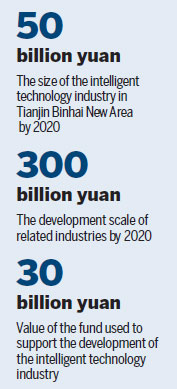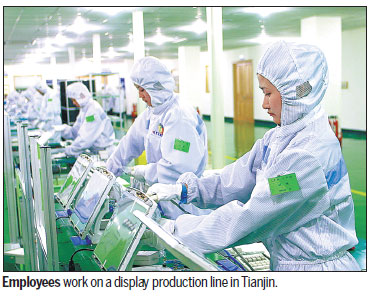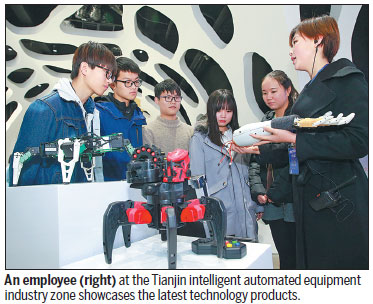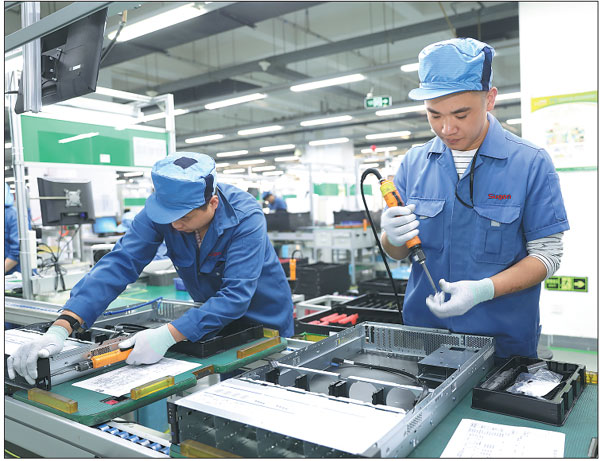
Tianjin Binhai New Area to focus on use of intelligent technology
Sector to boost economic growth, booming in size to become 50 billion yuan in 2020
Tianjin Binhai New Area has thrown its weight behind intelligent technology's ability to become a new driver of economic growth, and as a result is expecting the size of its intelligent industry to reach 50 billion yuan ($7.84 billion) by 2020.
In its role as a national research and development center of advanced manufacturing, Binhai New Area has sought to optimize the layout of its intelligent manufacturing industry and create an attractive environment for business in order to attract companies and professionals from home and abroad.
As part of its most recent efforts, Binhai New Area used the second World Intelligence Congress, held from Wednesday to Friday, as a platform to showcase its latest developments, trends and favorable policies.
According to officials from Binhai New Area, it plans to cultivate a batch of innovative artificial intelligence enterprises and resourceful entrepreneurs, to fulfill its goal of achieving more than 2,000 independent intellectual property rights by 2020.
The AI industry will contribute the bulk of the anticipated 50 billion yuan in intelligent revenues by 2020, with related industries expected to generate 300 billion yuan, according to officials from Binhai New Area. To achieve this goal, a slew of favorable policies have been introduced in recent years to speed up growth in intelligent technology and related industries.
To achieve this goal, a slew of favorable policies have been introduced in recent years to speed up growth in intelligent technology and related industries.
The Development Plan 2017-20 for its software and information service industry is already bearing fruit, according to Binhai New Area.
An integrated circuit design industry fund to support research and foster talent has also been implemented across the whole industry chain.
At last year's World Intelligence Congress, Tianjin Binhai New Area announced its plans to establish a 30-billion yuan fund with China Traffic Construction Group among others to support the development of the intelligent technology industry.
The fund will primarily be used to facilitate cooperation among global intelligent engineering technology centers and Binhai's Sino-German Industry 4.0 intelligent manufacturing center, its integrated circuit center, automotive electronics and automated driving center, and its intelligent transportation center.
"In the next step, Binhai New Area will boost the innovation of intelligent technology by developing advanced technology research, expanding AI application and cultivating AI innovation organizations," said a representative of Binhai New Area.
"We will also create AI innovation platforms, introduce and cultivate AI professionals, and build an open and inclusive support system."
Intelligent manufacturing, automated equipment, robots, healthcare, security, logistics, maritime, finance, port, city and other related areas will be included in the key areas for future development, the representative said.
One area that is already building an open and inclusive support system for its enterprises is the Tianjin Economic-Technology Development Area, also known as TEDA which has a specialized zone for intelligent automated manufacturing equipment.
The zone is working to build a public service platform that allows companies to share facilities and resources, in order to help lower costs and foster innovation.
Tianjin Chenxing Automation Equipment, a company developing parallel robots often used in flight and road simulators, ranks among the first batch of enterprises that settled in the intelligent automated equipment industry zone of TEDA.
"With the support of the zone, a series of problems that the company encountered during its development have been solved," a representative from the company said.
Binhai New Area hopes that its efforts in building itself into a national intelligent manufacturing demonstration zone, which showcases the fruits of the central government's Made in China 2025 strategy, will pay dividends in the near future.



Technicians assemble parts of computers at a plant in Tianjin Binhai New Area. Photos Provided to China Daily
(China Daily 05/18/2018 page24)

